5 dec 2016
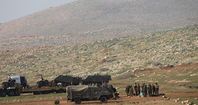
Heavy material losses were inflicted on Palestinian properties in the Jordan Valley due to the Israeli military drills over the past week.
The local activist Aref Daraghmeh affirmed that Israeli military drills inflicted heavy losses in dozens of agricultural lands in the Jordan Valley.
Over the past week, Israeli military vehicles have been deployed in large numbers throughout the Jordan Valley under the pretext of military drills.
Dozens of families were forcibly displaced during the drills period.
Heavy material losses are usually inflicted in such military drills in the area, where agricultural materials, sheds, and houses are partially or totally damaged.
The local activist Aref Daraghmeh affirmed that Israeli military drills inflicted heavy losses in dozens of agricultural lands in the Jordan Valley.
Over the past week, Israeli military vehicles have been deployed in large numbers throughout the Jordan Valley under the pretext of military drills.
Dozens of families were forcibly displaced during the drills period.
Heavy material losses are usually inflicted in such military drills in the area, where agricultural materials, sheds, and houses are partially or totally damaged.
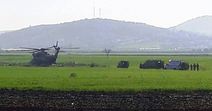
Israeli military vehicles have been deployed in large numbers throughout the Jordan Valley, east of the occupied West Bank, under the pretext of military drills.
The local activist Aref Daraghmeh affirmed that Israeli occupation forces (IOF) intensified their presence in the area over the past week under the pretext of military drills.
He pointed out that Israeli military drills are scheduled to take place in the area over the coming two days.
The military drills will forcibly displace more than ten Palestinian families, he continued.
Israeli forces started deploying throughout the Jordan Valley last Tuesday as a prelude to carry out large-scale maneuvers in the northern Jordan Valley, forcing Palestinians out of their homes.
Heavy material losses are usually inflicted in such military drills in the area, where agricultural materials, sheds, and houses are partially or totally damaged.
The local activist Aref Daraghmeh affirmed that Israeli occupation forces (IOF) intensified their presence in the area over the past week under the pretext of military drills.
He pointed out that Israeli military drills are scheduled to take place in the area over the coming two days.
The military drills will forcibly displace more than ten Palestinian families, he continued.
Israeli forces started deploying throughout the Jordan Valley last Tuesday as a prelude to carry out large-scale maneuvers in the northern Jordan Valley, forcing Palestinians out of their homes.
Heavy material losses are usually inflicted in such military drills in the area, where agricultural materials, sheds, and houses are partially or totally damaged.
4 dec 2016
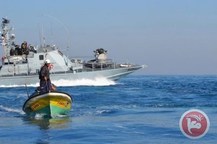
Israeli forces on Sunday at dawn opened fire at Palestinian fishing boats off the coast of the Gaza Strip, according to witnesses.
Witnesses told Ma'an that Israeli naval forces opened fire at the fishing boats while at sea in both the northern and southern Gaza Strip.
No injuries were reported.
Shortly after the fisherman were shot at, Israeli naval forces detained two fishermen and confiscated their boats off the cost of Beit Lahiya in the northern Gaza Strip, according to the head of the fishermen's union Nizar Ayyash.
Ayyash told Ma’an that Israeli naval forces detained brothers Sahfiq and Saadi, confiscated their fishing boats boats and took the boats to Israel's Ashdod port.
An Israeli army spokesperson told Ma’an she would look into reports of the incidents.
Israeli military incursions inside the besieged Gaza Strip and near the “buffer zone" which lies on both land and sea sides of Gaza, have long been a near-daily occurrence.
Palestinians who work near the “buffer zone” often come under fire from military forces, as the Israeli military has not made clear the precise area of the designated zone.
The Israeli army regularly open fires on Palestinian fishermen and farmers along the border areas, despite a ceasefire agreement that ended the 2014 war.
The practice has in effect destroyed much of the agricultural and fishing sectors of the blockaded coastal enclave.
Israeli forces also regularly detain Palestinian fisherman off the coast of Gaza working within the fishing zone, generally for alleged security reasons.
According to the Palestinian Center for Human Rights (PCHR), Israeli forces detained 71 fishermen and confiscated 22 fishing boats throughout 2015.
The center said that Israeli naval forces also opened fire on Palestinian fishermen at least 139 times over the course of the year, wounding 24 and damaging 16 fishing boats.
Witnesses told Ma'an that Israeli naval forces opened fire at the fishing boats while at sea in both the northern and southern Gaza Strip.
No injuries were reported.
Shortly after the fisherman were shot at, Israeli naval forces detained two fishermen and confiscated their boats off the cost of Beit Lahiya in the northern Gaza Strip, according to the head of the fishermen's union Nizar Ayyash.
Ayyash told Ma’an that Israeli naval forces detained brothers Sahfiq and Saadi, confiscated their fishing boats boats and took the boats to Israel's Ashdod port.
An Israeli army spokesperson told Ma’an she would look into reports of the incidents.
Israeli military incursions inside the besieged Gaza Strip and near the “buffer zone" which lies on both land and sea sides of Gaza, have long been a near-daily occurrence.
Palestinians who work near the “buffer zone” often come under fire from military forces, as the Israeli military has not made clear the precise area of the designated zone.
The Israeli army regularly open fires on Palestinian fishermen and farmers along the border areas, despite a ceasefire agreement that ended the 2014 war.
The practice has in effect destroyed much of the agricultural and fishing sectors of the blockaded coastal enclave.
Israeli forces also regularly detain Palestinian fisherman off the coast of Gaza working within the fishing zone, generally for alleged security reasons.
According to the Palestinian Center for Human Rights (PCHR), Israeli forces detained 71 fishermen and confiscated 22 fishing boats throughout 2015.
The center said that Israeli naval forces also opened fire on Palestinian fishermen at least 139 times over the course of the year, wounding 24 and damaging 16 fishing boats.
3 dec 2016
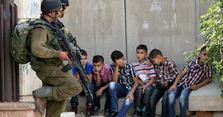
A right-wing Knesset member intends to submit a “racist” bill calling for economically punishing families of Palestinian children and teenagers who are convicted of throwing stones and launching attacks against Israelis.
According to Walla news website, the bill, which was prepared by MK Miki Zohar (Likud), will be referred to the Knesset’s ministerial commission for legislation on Sunday in order to obtain approval for tabling it for vote by Knesset members.
Zohar claimed that making families responsible for their children’s actions is part of what he described as Israel’s fight against terrorism.
He also said that Israel should deprive families of Palestinian attackers of all national insurance allowances, including unemployment benefits, pensions and work-injury payments.
This new legislation is only aimed at the Palestinians. The Israeli authorities have never taken any punitive measures, such as demolition of homes, against Jewish families, whose relatives were convicted of attacking Palestinians.
According to Walla news website, the bill, which was prepared by MK Miki Zohar (Likud), will be referred to the Knesset’s ministerial commission for legislation on Sunday in order to obtain approval for tabling it for vote by Knesset members.
Zohar claimed that making families responsible for their children’s actions is part of what he described as Israel’s fight against terrorism.
He also said that Israel should deprive families of Palestinian attackers of all national insurance allowances, including unemployment benefits, pensions and work-injury payments.
This new legislation is only aimed at the Palestinians. The Israeli authorities have never taken any punitive measures, such as demolition of homes, against Jewish families, whose relatives were convicted of attacking Palestinians.
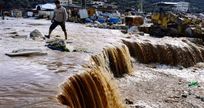
Bad weather conditions have led to considerable material damage and disrupted life in Palestinian areas in the West Bank.
In Nablus and other surrounding towns, torrential rains swamped roads, leading to their closure, as well as several homes and stores.
A Palestinian Information Center (PIC) reporter said that rescue crews from the municipality and volunteers in Nablus intervened and managed to open some roads and provide assistance to citizens, whose homes and vehicles were flooded or surrounded by rain waters.
Several towns and hamlets in the central Jordan Valley near Nablus were also affected by the storm, especially in Ayn Shibli town and Furush Beit Dajan town.
Dozens of greenhouses and crops sustained damage from strong winds in Beit Dajan town, a local official told the PIC.
Rains also flooded sewage systems in Nablus and caused wastewater to overflow and dash into nearby areas, including Ayn Shibli town.
As a result, unpleasant odors spread in Ayn Shibli, amid fears that rains mixed with wastewater could flood manholes and enter homes.
Several homes were flooded as well in Balata refugee camp, east of Nablus, especially in al-Hashasheen neighborhood. Local volunteers provided help to families in affected homes.
In Ramallah, homes, stores, and vehicles and other properties were also affected by the storm and some of them sustained damage.
The storm also hit neighborhoods in Bethlehem city and other West Bank cities and caused floods in some areas.
In Nablus and other surrounding towns, torrential rains swamped roads, leading to their closure, as well as several homes and stores.
A Palestinian Information Center (PIC) reporter said that rescue crews from the municipality and volunteers in Nablus intervened and managed to open some roads and provide assistance to citizens, whose homes and vehicles were flooded or surrounded by rain waters.
Several towns and hamlets in the central Jordan Valley near Nablus were also affected by the storm, especially in Ayn Shibli town and Furush Beit Dajan town.
Dozens of greenhouses and crops sustained damage from strong winds in Beit Dajan town, a local official told the PIC.
Rains also flooded sewage systems in Nablus and caused wastewater to overflow and dash into nearby areas, including Ayn Shibli town.
As a result, unpleasant odors spread in Ayn Shibli, amid fears that rains mixed with wastewater could flood manholes and enter homes.
Several homes were flooded as well in Balata refugee camp, east of Nablus, especially in al-Hashasheen neighborhood. Local volunteers provided help to families in affected homes.
In Ramallah, homes, stores, and vehicles and other properties were also affected by the storm and some of them sustained damage.
The storm also hit neighborhoods in Bethlehem city and other West Bank cities and caused floods in some areas.
28 nov 2016
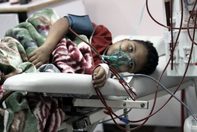
Palestinian hospitals in the besieged Gaza strip are in an acute crisis because of a severe shortage of fuel that is needed to run the generators, threatening lives of many patients.
Fuel crisis in Gaza has embittered the lives of medical patients from time to time. They live in constant fear that the electricity will suddenly be cut suddenly, and medical devices will cease to function, aggravating the health conditions of the patients and putting their lives at risk of death.
Dr. Nabil Albrkona, the supervisor of children’s nurseries and hospitals in Gaza, said to Al Ray Palestinian Media Agency that Annaser hospital for children is affected with an acute shortage of fuel for a week, and the amount of fuel that it has is only sufficient for a day.
He explained that the ICU units in the hospital are most affected, as premature babies need incubators which require electricity around the clock.
He went to say that the emergency department in the hospital receives, daily, many cases of respiratory disease which need nebulizers that run on electricity.
He also said that the hospital suffers a shortage in many types of medicines and medical equipment.
Dr. Ayman Sahbani, director of the ambulance and emergency department at Shifa Hospital, warned of running out of the fuel in the hospital, which will affect all departments, noting that the amount of the fuel is only sufficient for three days.
He noted that the most affected units in the hospital are the ICU and dialysis department.
He said that, in case the hospital is not supplied with a sufficient amount of fuel, the lives of many patients would put at risk of death, noting that the amount of fuel that being pumped from Ramallah is not sufficient.
Spokesperson for the Palestinian Ministry of Health, Ashraf al-Qedra, previously stated that the hospitals in Gaza are severely affected with fuel crisis, pointing out that the hospitals faces very tough choices, lest they be supplied with fuel.
Al-Qedra said that the hospitals need 420,000 liter of fuel, monthly, for eight hours a day of electricity, explaining that if the power was cut off more than eight hours, it signifies a need for more fuel.
He stressed that the real crisis has already begun in Mohammed Dura hospital for children, and the scenario will be repeated in other hospitals if the shortage continues.
The current electricity deficit in Gaza began with an Israeli airstrike on the power plant (GPP), in June of 2006, and continues to severely disrupt the delivery of basic services, undermining already vulnerable livelihoods and living conditions.
Gaza has three sources of electricity: the GPP, which has been operating at approximately half or less of its capacity (60 out of a potential 120 mega watts); and electricity purchased from Israel (120 MW) and Egypt (28 MW), via 13 crossborder feeder lines. Combined, these are able to meet less than 45 per cent of the estimated 470 MW electricity demand.
The power supply has been significantly impaired over recent years, by various factors, including the lack of funding for fuel for the GPP; the impact of unrepaired damage caused by Israeli attacks on the GPP and power networks; the lack of upgrade to the network; and the recurring malfunctioning or breakdown of the Israeli and Egyptian feeder lines.
Fuel crisis in Gaza has embittered the lives of medical patients from time to time. They live in constant fear that the electricity will suddenly be cut suddenly, and medical devices will cease to function, aggravating the health conditions of the patients and putting their lives at risk of death.
Dr. Nabil Albrkona, the supervisor of children’s nurseries and hospitals in Gaza, said to Al Ray Palestinian Media Agency that Annaser hospital for children is affected with an acute shortage of fuel for a week, and the amount of fuel that it has is only sufficient for a day.
He explained that the ICU units in the hospital are most affected, as premature babies need incubators which require electricity around the clock.
He went to say that the emergency department in the hospital receives, daily, many cases of respiratory disease which need nebulizers that run on electricity.
He also said that the hospital suffers a shortage in many types of medicines and medical equipment.
Dr. Ayman Sahbani, director of the ambulance and emergency department at Shifa Hospital, warned of running out of the fuel in the hospital, which will affect all departments, noting that the amount of the fuel is only sufficient for three days.
He noted that the most affected units in the hospital are the ICU and dialysis department.
He said that, in case the hospital is not supplied with a sufficient amount of fuel, the lives of many patients would put at risk of death, noting that the amount of fuel that being pumped from Ramallah is not sufficient.
Spokesperson for the Palestinian Ministry of Health, Ashraf al-Qedra, previously stated that the hospitals in Gaza are severely affected with fuel crisis, pointing out that the hospitals faces very tough choices, lest they be supplied with fuel.
Al-Qedra said that the hospitals need 420,000 liter of fuel, monthly, for eight hours a day of electricity, explaining that if the power was cut off more than eight hours, it signifies a need for more fuel.
He stressed that the real crisis has already begun in Mohammed Dura hospital for children, and the scenario will be repeated in other hospitals if the shortage continues.
The current electricity deficit in Gaza began with an Israeli airstrike on the power plant (GPP), in June of 2006, and continues to severely disrupt the delivery of basic services, undermining already vulnerable livelihoods and living conditions.
Gaza has three sources of electricity: the GPP, which has been operating at approximately half or less of its capacity (60 out of a potential 120 mega watts); and electricity purchased from Israel (120 MW) and Egypt (28 MW), via 13 crossborder feeder lines. Combined, these are able to meet less than 45 per cent of the estimated 470 MW electricity demand.
The power supply has been significantly impaired over recent years, by various factors, including the lack of funding for fuel for the GPP; the impact of unrepaired damage caused by Israeli attacks on the GPP and power networks; the lack of upgrade to the network; and the recurring malfunctioning or breakdown of the Israeli and Egyptian feeder lines.
26 nov 2016

The administrations of Makassed and Augusta Victoria (Matla’) Hospitals in Occupied Jerusalem have warned that they could shut down because of the Palestinian Authority’s failure to pay them 63 million dollars in debts.
The hospitals have become unable to buy medical supplies and fulfill their financial obligations, according to the administrations.
“The two hospitals, which are threatened with closure, are considered the largest steadfast national institutions in Jerusalem and frequented by more than 150,000 patients every year,” director of al-Makassed hospital Rafiq al-Husseini said.
“However, the administrations of al-Makassed Hospital and al-Matla’ Hospital, after they knocked on all official doors to collect part of the receivables, returned empty-handed and without getting results. We were able to get only crumbs during last month,” Husseini added.
“We have very limited options now. If the financial situation continues to be the same, we at the Hospitals of Makassed and al-Matla’ would regrettably tell the patients that we will be forced, as of November 29, to stop receive non-emergency cases referred from the West Bank and Gaza,” he warned.
The hospitals have become unable to buy medical supplies and fulfill their financial obligations, according to the administrations.
“The two hospitals, which are threatened with closure, are considered the largest steadfast national institutions in Jerusalem and frequented by more than 150,000 patients every year,” director of al-Makassed hospital Rafiq al-Husseini said.
“However, the administrations of al-Makassed Hospital and al-Matla’ Hospital, after they knocked on all official doors to collect part of the receivables, returned empty-handed and without getting results. We were able to get only crumbs during last month,” Husseini added.
“We have very limited options now. If the financial situation continues to be the same, we at the Hospitals of Makassed and al-Matla’ would regrettably tell the patients that we will be forced, as of November 29, to stop receive non-emergency cases referred from the West Bank and Gaza,” he warned.
